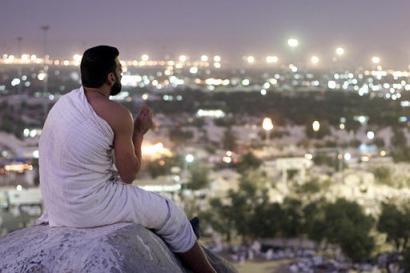What is Pilgrimage?

Pilgrimage in the Arabic language means aim, destination or purpose. The reason is clear: This pilgrimage is the ultimate journey of showing submission (‘ubūdīyah) to God. It is the ultimate destination in which you turn to the House of God – the Ka‘bah – with both body and heart.
God has invited you to His House, which He has called the Bayt al-‘Atīq – the ancient, liberated and liberating house.Your pilgrimage is one of freedom and liberation. For, as your body leaves its material house to journey to God’s House, your heart is meant to disengage from the lower self (nafs), the shaytān, and the world (dunya) and journey to God.
The reward for an accepted pilgrimage is to return home with the purity of a newborn child and all sins forgiven. What could be a greater incentive! But beware, for the pilgrimage is a selective process. Only a few will attain an accepted pilgrimage, which is a pilgrimage performed correctly, without any disobedience to God and without indulging in any argumentation. Be prepared. Be vigilant. Be focused. This will be one of the greatest – and sweetest – struggles of your life. And though you will long and dream for the rest of your life to go back, you may never return again.
You will be journeying from your earthly house to Makkah, your spiritual home, the most beloved place to God in all of space and time. God Himself has decreed it to be so since the beginning of creation. There is no place more blessed, more beautiful, more virtuous, more exalted than Makkah. Every inch and every corner of Makkah is a sanctuary made sacred by God. The more you revere Makkah, the more you will be ennobled by God. We must take the greatest of care to never think casually of our sojourn in Makkah or live within its precincts in disobedience or negligence.
Some reports teach that it was in Makkah that our father Ādam (‘alayhi al-salām) longed to go back to paradise and be in the presence of God. To console his loneliness, God commanded him to circumambulate around the space of the current Ka‘bah. And Ādam did, and felt whole again.
Other texts teach that Noah (’alayhi al-salām), Abraham (’alayhi al-salām), and many Prophets before them (’alayhim al-salām), all did circumambulation around God’s sacred House. Their spiritual energy and legacy fills the air.
You will be walking in the footsteps of the Messenger of God (peace and blessings be upon him) and his noble Companions.
Shelter, Solace and Sight
The pilgrimage and its rites are described in various and powerful ways by God and His Messenger (peace and blessings be upon him). Through these descriptions, we gain insight into the deeper meanings of it. The rites of the pilgrimage are described, for example, as manāsik, mashā‘ir and mashāhid.
Mansak (plural manāsik), usually translated as ritual, connotes shelter (maskan) and tranquility (sukūn). The rites of pilgrimage are residences of shelter and tranquility for the heart.
Mash‘ar (plural mashā‘ir) connotes feeling and experience. The rites of pilgrimage cause the heart to feel and experience the sweetness of nearness to God.
Mashad (plural mashāhid) is to witness with the heart the blessings of God at every station.
Each word connotes a different inner dimension of pilgrimage, as the movement, not only of your body or limbs, but of your heart. For as your body journeys from one place to another, so too must your heart travel through various stations (maqāmāt), each of which will provide it with shelter, solace and inner sight.
Become Angelic
Pilgrimage is your chance to do as the angels do and to live with the delight of an angel.
In circumambulation, you will be mirroring the worship of the angels, those heavenly creatures created of pure light and enveloped in the worship of God. Texts teach that the Ka‘bah is connected in an imperceptible way to the heavenly Ka‘bah of the angels, around which they are constantly in circumambulation. Seventy thousand angels perform circumambulation around this house and are replaced with others, never to cease in their worship.
Around the Ka‘bah, we are in a heavenly dimension. Near the Ka‘bah is the black stone, and the area in which the Prophet Abraham stood, both gems from Jannah. We are taught that the stone was darkened by the sins and transgressions of man. Its heavenly light is now folded from us. The stone will be personified in the afterlife by God and will witness on behalf of those who approached it with truth and sincerity. The stone can be said to take a picture of your heart as you stand before it. Kissing the stone was an act done by the Prophet Muhammad and so today you find many that perform the same action.
May our hearts find their ultimate rest by journeying to God long after our bodies have returned from pilgrimage. May we always be in pilgrimage.
 Arabic
Arabic French
French Deutsch
Deutsch Urdu
Urdu Pashto
Pashto Swahili
Swahili Hausa
Hausa
